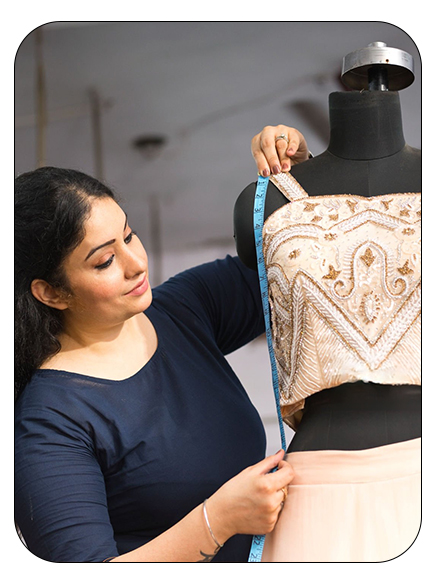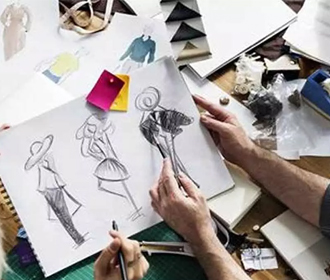- Phone Number +91 93105 27945
- Email abiloninstitute@gmail.com
- Registration/Enquiry Click Here to Enquiry
Bachelor of Vocational Studies
(Fashion Technology)
Degree | Diploma | Certificate


The aim of this course is to prepare candidates for the garment industry so they can seamlessly integrate into any factory setting or even launch their own boutique or industry venture. This dual pathway fosters economic independence. To achieve this, the curriculum introduces key concepts such as commercial production, seasonal trend analysis, theme identification, and the creation of mood and color boards. Essentially, it guides students through the process of developing a comprehensive range aligned with a business plan and technical specifications. The entire course spans three years, divided into six semesters, with two semesters each year.
If you're eager to stay ahead of the latest fashion trends, enrolling in the B.Voc Fashion Technology program at Kalinga University will guide you toward your ideal runway aspirations.
Bachelor of Vocational Studies (B.Voc) is a three-year degree program offered at Abilon Institute.
The minimum eligibility to take admission in B.Voc is 10+2 (in any stream) or equivalent or 2 year ITI Diploma after Class 10th or 3 Year Polytechnic Diploma after Class 10th.
The Bachelor of Vocational Studies in Fashion Technology program prepares graduates for a variety of career opportunities in the fashion industry. Some of the job areas that graduates can explore include:
| Job Area | Description |
|---|---|
| Fashion Designing | Creating new designs for clothing, accessories, and footwear. |
| Pattern Making | Creating patterns for clothing and accessories. |
| Garment Production | Overseeing the manufacturing process of clothing and accessories. |
| Fashion Merchandising | Managing the buying and selling of clothing and accessories. |
| Textile Designing | Creating patterns and designs for fabrics and textiles. |
| Fashion Photography | Capturing images of clothing and accessories for advertising. |
| Fashion Styling | Creating fashionable outfits and looks for clients. |
| Fashion Marketing & Branding | Promoting fashion products and managing fashion brands. |
A Fashion Technology course combines fashion design with advanced technology, focusing on textiles, garment construction, and digital tools like CAD. It covers areas such as smart fabrics, 3D printing, and sustainable fashion innovations. Graduates can work in fashion design, production, or textile engineering.
A Fashion Technology professional develops innovative fabrics, designs garments using digital tools, and enhances production processes. They work in areas like apparel manufacturing, textile engineering, and sustainable fashion development.
A Fashion Technology degree typically takes 3 to 4 years for a bachelor's program and 1 to 2 years for a master's. Diploma and certification courses can range from 6 months to 2 years.
By 2030, fashion will be dominated by sustainability, AI-driven design, and smart textiles. Trends like 3D printing, circular fashion, and digital clothing will redefine the industry.
After 12th, a Fashion Technology course provides a blend of design, technology, and manufacturing skills. Options range from diplomas to bachelor's degrees (B.Tech/B.Sc) specializing in areas like apparel technology, textile design, or fashion merchandising. Coursework includes garment construction, CAD/CAM, textile science, supply chain management, and trend analysis. Eligibility usually requires a 10+2 pass with science or any stream depending on the specific course requirements. Career paths include fashion technologist, production manager, quality control supervisor, and textile designer. Entrance exams may be required for some institutions.
This fashion designing course is aimed to inculcate a design mindset among the students. The course entails all the contemporary demands of the industry and hence practices on-hands training for each student. Students get a thorough understanding of styling and fashion couture designing. The idea is that the students are able to turn their creativity into an aesthetic approach. They are made adept to understand the current and upcoming fashion trends and thereby work accordingly. Students are given the option to choose their areas of specialization. The list of these specializations is decided based on the industry demand. All of these factors make Abilon’s fashion designing course the best fashion design course in Faridabad.
The program offers students hands-on training to become the best in the fashion designing industry. The students get one-on-one instruction in many modules such as:

Workshops are an important part of Fashion Designing course. They help broaden the perspectives of our students and allow them do diversify their skills. In a similar way, seminars are extended events where our students learn about more professional aspects of working in the fashion designing industry.
Fashion Design
Pattern Making (fashion)
Textiles
3D Fashion Design
Brand Management
Product Development
Jewelry Design
Fashion Modeling
Embroidery
Jewelry Making
Procreate Digital Illustration
Painting